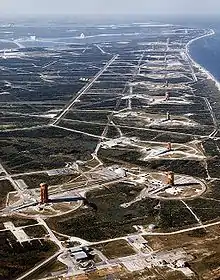Missile Row
Missile Row was a nickname given in the 1960s to the United States Space Force and NASA launch complexes at Cape Canaveral Space Force Station (CCSFS). Operated by the 45th Space Wing since 1949, it was the site of all pre-Apollo 8 manned launches, as well as many other early Department of Defense (DoD) and NASA launches. For the DoD, it plays a secondary role to Vandenberg AFB in California, but is the launch site for many NASA unmanned space probes, as those spacecraft are typically launched on United States Space Force launchers. Active launch vehicles are in bold.

Much of the support activity for Cape Canaveral Space Force Station occurs at Patrick Space Force Base to the south, its reporting base.
Inactive sites
Active sites
Some of the launch complexes have been recommissioned for modern space vehicle launches.
| Site | Status | Uses |
|---|---|---|
| Space Launch Complex 13 | Active | Current: SpaceX Falcon 9 and Falcon Heavy first stage landing site[2] Formerly: Atlas, Atlas Agena |
| Space Launch Complex 40 | Active | Current: Falcon 9 cargo and satellite missions Formerly: Titan III, Titan IV |
| Space Launch Complex 41 | Active | Current: Atlas V Formerly: Titan III, Titan IV |
| Space Launch Complex 37B | Active | Current: Delta IV Formerly: Saturn I, Saturn IB |
Other
| Site | Status | Uses |
|---|---|---|
| Atlantic Missile Range drop zone | Inactive | High Virgo, Bold Orion, Hound Dog, Skybolt |
| Grand Turk Island drop zone | Inactive | |
| Mobile Launch Area | Inactive | Lark, Matador, MX-775, Snark |
| SLBM Launch Area | Inactive | Polaris, Poseidon, Trident |
| Cape Canaveral Space Force Station Skid Strip | Active | Navaho, Pegasus, Pegasus XL |
References
- "Launch Complex 29". Air Force Space & Missile Museum. Archived from the original on 2012-04-07. Retrieved 2011-12-15.
- Gruss, Mike. "SpaceX Leases Florida Launch Pad for Falcon Landings". Spacenews. Retrieved 13 February 2015.
